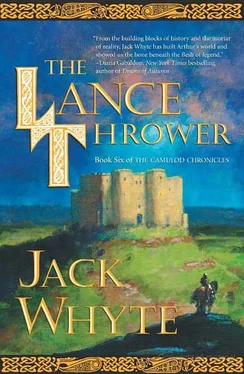I found myself unsure of what to say over his grave, not having known if he was Christian or Druid. I had never been curious about his creed before. He had simply been Merlyn, sufficient unto himself, unbeholden to anyone, god or man. Now, however, I felt a need to say something aloud, notwithstanding that I could not name his name, and as my companions stood with lowered heads, just beginning to stir and shuffle with impatience, I cleared my throat and spoke, trusting my instincts.
“We know not who you are, or were, nor do we know what God or gods you cherished. We know not how you lived, or how you died; how long you knew this place, or whence you came. We only know we found your bones awaiting us, reminding us that all men come to death. Rest you in peace here, now, surrounded by the beauty of this hidden place, and may none disturb your bed from this day forth. Fare well, wheresoever your spirit roams.”
We arrived back at Glastonbury at noon the following day, having met or seen no living soul on our journey, and as we approached, the anchorites began to gather in silence to watch us. The same old man was there at their head, but this time as I drew near he watched me keenly, his eyes slitted, and I knew he knew me now.
I dismounted in front of him and held out the rope reins of his garron. “Safely returned,” I said. “These old shanks are grateful for your generosity in sharing.”
Another man stepped forward to take the reins, and the old leader nodded.
“You are the Frank,” he said.
“I am. And you are Declan.” The name had come to me as he spoke. “How do you know me now, but not before?”
“It was the horse. I saw you in the way you sat as you came in. Before, when you arrived, I had not thought to see you, so did not. I have something for you.”
“Something for me? How could you have anything for me?”
“Come you.” I followed him, waving to my men to stay where they were. The old man made no attempt to speak again and I went with him in silence until we reached one of the simple huts surrounding the stone ecclesia, where he stooped to enter the low doorway.
“The building looks well,” I said, gazing up at the stone church and feeling the need to say something, shearing the banality of my words as they emerged. “Is God still worshipped here?”
Declan stopped on the threshold of his hut and looked back at me over his shoulder as though I had broken wind. “It is His house,” he said. “Where else would men worship Him? Come.”
Feeling foolish, I bent to follow him into the tiny room that was even barer than Merlyn’s hut had been, and so low that I had to stand bent over. It was dark in there, and smelled of straw, and the old man moved directly to the rough-edged hole in the wall that served as a window, where he picked up a flat, square wooden box a handspan long and held it out to me.
“What is it?” I asked, taking it and holding it up to the light from the window. It was well made and had been richly polished once, but years of sitting in that window space, open to whatever weather prevailed, had deprived it of its luster, leaving only a fragmented pattern of flecks of ancient varnish, cracked and peeled.
“It is yours,” Declan said. “See for yourself.”
I replaced it on the window ledge and opened the hinged lid, which squeaked in protest. Inside, lying on a hard, textured bed of what might once have been brushed leather, was a pair of blackened, tarnished Roman spurs, their straps hardened to the consistency of wood, cracked and fissured by time. I lifted them out, one in each hand, and felt their solid, heavy weight. Blackened as they were by the years and lack of use, their delicate engravings were invisible, but I knew them well. I had been with Arthur when we found them among the rubble of a ruined house close to the ancient Roman fortress of Deva, far to the north and west of Camulod. The engravings explained that these were the ceremonial spurs of Petrus Trebonius Cinna, a senior officer of Equestrian rank, serving in the Twentieth Legion, the Valeria Victrix , that had served long and honorably here in Britain since the days of the early Caesars. They must have lain where we found them for hundreds of years, for the decorative arch of their ancient leather straps bore the insignia of Claudius Caesar, and three hundred years had passed since he ruled Rome.
I looked at the old man, deeply perplexed. “Who gave you these to hold for me? Merlyn?”
He shook his head. “The King.” The old man’s voice was barely audible but filled with awe and reverence. “Arthur, the Riothamus himself, may God’s light shine on him forever. He stayed with us the night before he left for Camlann, where they killed him. ‘Declan,’ he said to me, ‘the Frank will come back someday. When he does, give him these, from me, and bid him give them to his son.’” He cocked his head. “I never thought to see your face again, but he was right. You came. And now I have done as he wished.” He glanced down at the spurs in my hands. “I have never touched those. His were the last hands to hold them. Do you have a son?”
My throat had closed as though gripped in an iron fist, and I had to swallow before I could respond. “Aye,” I said, my voice rasping. “I have three.”
“Your firstborn, then, he must have meant.”
“He did. But my firstborn was a daughter.”
“Well, then, let her hold them for her son.”
“She has one. His name is Tristan.”
He cleared his throat. “Aye, well, they are for him, then. Is he worthy of them?”
I pictured my grandson’s open, shining face with its strangely brilliant, gold-flecked eyes. “Oh, aye,” I breathed. “More than worthy, I think. He possesses many of the characteristics of the Tristan in whose honor he was named, even if he is of different blood. He will wear these spurs well, when he is grown.”
“Good. Then may he wear them with honor. Now we had better go outside again, before your back is locked into that stoop forever.”
The next afternoon, as the shores of Gaul came into our view again, I caught my son Clovis staring at me with a strange expression on his face. He quickly looked away when he caught me regarding him. I went to sit beside him on the rower’s bench he occupied.
“Something is on your mind,” I said, keeping my voice low. “Bothering you. What is it?”
He looked wide-eyed at me. “What d’ you mean, Father?”
“Just what I said. Three times now I have caught you gazing at me as though I were suddenly a stranger, so I want to know what you are wondering about.”
“I’m not wondering about anything, Father. Not really.”
I sighed. “Clovis, you know me well enough to know that I keep little from you and I seldom react with anger to a straightforward question. So humor me, if you will, and tell me what you’re thinking. Or ask me the question plainly on your mind.”
He sat staring off into the distance, watching the distant coast rise and fall with the swell of the waves; and then he muttered something indistinct.
“What? I didn’t hear that. Speak up.”
His face flushed. “I said I was wondering who you really are.”
“What?” I laughed aloud. “I’m your father. What kind of a question is that?”
“Aye, sir, you are my father, and I thought I knew you, but now I am unsure.”
He would not look at me, so I reached out and poked him in the ribs. “How so? What are you trying to say?”
He turned, finally, and looked me in the eye. “You have two names I never knew before, Father—two names I’ve never heard. Hastatus, and the Frank. And now I find myself wondering how many more you have, yet unrevealed. The old man yesterday recognized you and said, ‘You are the Frank.’ Not simply a Frank, any old Frank as we all are, but the Frank. The name held great significance for him.”
Читать дальше









